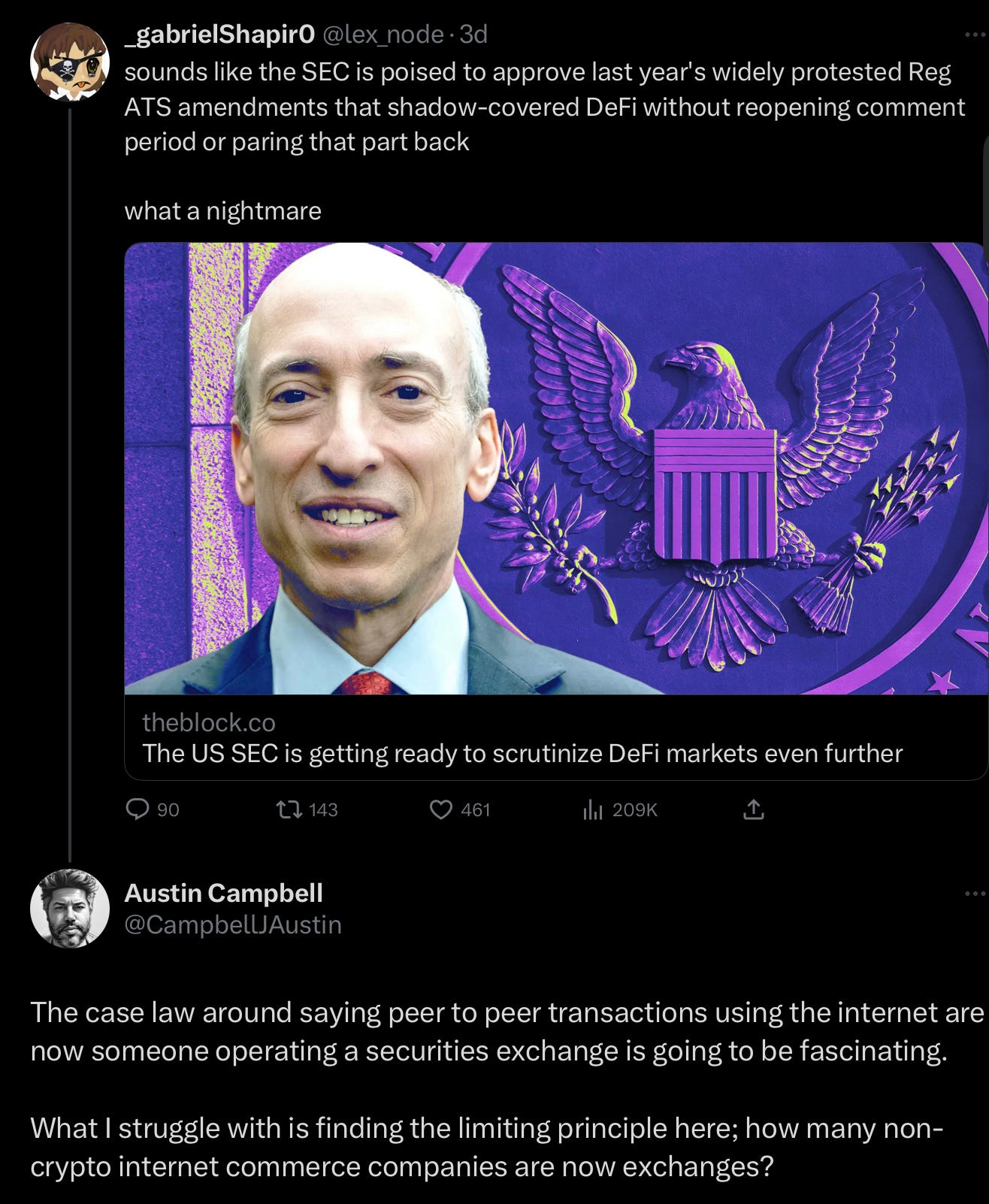SEC, DeFi Platforms, and Bittrex
Will there be a ban on DEX?
Disclaimer, NFA, all that legal stuff: All the information presented on this publication and its affiliates is strictly for educational purposes only. It should not be construed or taken as financial, legal, investment, or any other form of advice.
Hi folks 🙋🏻♂️,
I’m trying something new.
By this point all of you are aware of my other newsletter. In three months, it reached 4,000 subscribers, closed the first ad deal, and is currently growing at ~1,000 sub/month.
But that is neither here nor there.
I don’t want to abandon this publication (it will be my personal forever publication, even when I’m in my 50s) — and I don’t want it to be super inconsistent (such as releasing one post every three months or so).
Thus, I need a way to write useful and thoughtful content here while being mindful of my time. I do, have a day job, after all.
With that said, I’m trying a thought dump style of a post where I’ll be limiting myself to only spend 15 minutes per day.
It will be (dare I say) between Ben Thompson’s Stratechery and a collection of comprehensive tweets.
The timing also aligns with Substack’s recent move to launch Notes.
All of you are early supporters of my writings, so I want to keep y’all in the loop. As always, thanks for being there. I really appreciate it 🍻
Oh, talking about my job, we recently helped launched the first regulated European Bitcoin Index Futures — in collaboration with FTSE Russel and Eurex. This is a huge milestone in European crypto institutional adoption.
I just thought I would share 👌
SEC Might Ban DeFi Platforms
On Friday, the US SEC declared that rules governing exchanges in the US will also apply to DeFi. SEC Chair Gary Gensler made a strong statement:
“Make no mistake: many crypto trading platforms already come under the current definition of an exchange and thus have an existing duty to comply with the securities laws,”
“Yet these platforms are acting as if they have a choice to comply with our laws. They don’t.”
Let’s backtrack for a bit. This isn’t a new initiative by the SEC.
It was prepared since last year.
Although there’s no change in rules, the action was an effort by the SEC to explicitly state that existing rules for traditional exchanges apply to DeFi platforms. Unsurprisingly, many aren’t happy with the SEC’s action. Even SEC’s own Commissioner Hester Pierce publicly stated her criticism.
There’s a 30-day comment period for the SEC to hear public opinion. However, there will be voting to finalize the proposed clarification and amendments to the definition of an “exchange” — and it’s predicted to pass.
I’ve always said that crypto regulatory debate will always involve an ideological aspect. It’s a controversial technology by nature. There will be differing views that aren’t exactly black-and-white clear that one side is at fault.
Laura Shin made a great point on her podcast.
Gensler’s dissent towards the industry doesn’t mean that he doesn’t understand crypto, but he might just be disagreeing with the ethos
This is a reality that most crypto participants might not be able to accept.
To me, it looks extremely clear that builders need to to hedge their regulatory risk. If possible, build outside of the US. Find your PMF and target other markets that can get you to revenue, or even profitability, ASAP.
Don’t launch a token if there’s not a good reason for it yet.
Big investors such as a16z, Paradigm, Haun Ventures, have a clear role to play in the US. Help the industry fight for better regulations by educating policymakers. If you’re a smaller investor, help your founders navigate the current situation via strategic move.
SEC Sues Bittrex
To add more spices to the ongoing regulatory headache in the US, the SEC sues Bittrex (and its co-founder) on Monday, alleging that Bittrex has been operating an unregistered national securities exchange.
The SEC did this after sending Wells’ Notice to Bittrex, which prompted the company to shut down its US operations.
From Axios:
The Securities and Exchange Commission is suing Seattle-based Bittrex, less than a month after the crypto exchange said it was leaving the U.S. market due to regulatory uncertainties.
Driving the news: The SEC on Monday charged the platform for illegally operating a national securities exchange, clearing agency and broker, servicing U.S. investors.
The lawsuit also names former chief Bill Shihara and parent company Bittrex Global GmbH.
The intrigue: The complaint argues that Bittrex was purposefully non-compliant, and not unclear, a message SEC Chair Gary Gensler also tweeted Monday.
It alleges the company, over the course of Shihara's tenure, purposely evaded rules that it knew applied to it, coordinating with crypto issuers to "scrub" certain statements that would have otherwise precluded the asset from trading on Bittrex's platform.
Quick take: Like with other SEC complaints that investigate matters that happened years ago, some, more obscure tokens are back in the spotlight.
What Goes Around Comes Around
The key takeaways from SEC’s Bittrex action is that it names 6 crypto assets as securities in the complaint:
OmiseGo (OMG)
Algorand (ALGO)
Dash (DASH)
Tokencard (TKN)
Naga (NGC)
I-house Token (IHT)
Crypto Twitter is quick to discover that SEC Chairman gensler has previously “promoted” the crypto asset Algorand (ALGO), which is named above. Gensler spoke highly of his friend and the founder of Algorand, Silvio Micali.
“Silvio Micali’s Alogrand, he’s a Turing Award winner at MIT I work with… Silvio’s got a great technology, it has performance, you could create Uber on top of it.”
What’s interesting to me here is that as the US increases its aggression towards crypto, it will become an opportunity in the UK (and also EU). We’re seeing a more sensible approach to regulations such as EU’s MiCA, and a much more welcoming attitude from the UK’s administration.
Until next time,
Marco M.






